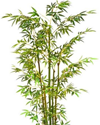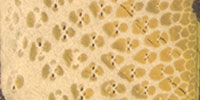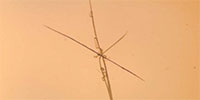 About Bamboo
About Bamboo
Bamboos are of notable economic and cultural significance in South Asia, Southeast Asia and East Asia, being used for building materials, as a food source, and as a versatile raw product!
Bamboo is one of the fastest-growing plants on Earth, with reported growth rates of 100 cm (39 in) in 24 hours. However, the growth rate is dependent on local soil and climatic conditions, as well as species, and a more typical growth rate for many commonly cultivated bamboos in temperate climates is in the range of 3–10 centimeters (1.2–3.9 in) per day during the growing period. Primarily growing in regions of warmer climates, vast fields existed in Asia. Some of the largest timber bamboo can grow over 30 m (98 ft) tall, and be as large as 15–20 cm (5.9–7.9 in) in diameter.
Unlike trees, individual bamboo stems, or culms, emerge from the ground at their full diameter and grow to their full height in a single growing season of three to four months. During these several months, each new shoot grows vertically into a culm with no branching out until the majority of the mature height is reached. Then, the branches extend from the nodes and leafing out occurs. In the next year, the pulpy wall of each culm slowly hardens. During the third year, the culm hardens further. The shoot is now considered a fully mature culm. Around 5–8 years later, culm will collapse and decay. This brief life means culms are ready for harvest and suitable for use in construction within about three to seven years. Individual bamboo culms do not get any taller or larger in diameter in subsequent years than they do in their first year, and they do not replace any growth lost from pruning or natural breakage. Bamboos have a wide range of hardiness depending on species and locale.
Bamboo used for construction purposes must be harvested when the culms reach their greatest strength and when sugar levels in the sap are at their lowest. Harvesting is best at the end of the dry season, a few months prior to the start of the wet.
In Asian culture, Bamboo's long life makes it a Chinese symbol of longevity, while in India it is a symbol of friendship. Bamboo, one of the “four gentlemen” (bamboo, orchid, plum blossom and chrysanthemum), plays such an important role in traditional Chinese culture that it is even regarded as a behavior model of the gentleman. As bamboo has some features such as uprightness, tenacity and hollow heart, people endow bamboo with integrity, elegance and plainness.
What is Bamboo?
Chemical composition:
Bamboo is a tribe of flowering perennial evergreen plants in the grass family. Giant bamboos are the largest members of the grass family. It is mainly composed of cellulose and lignin, about 70% and 20% respectively.
Anatomical Structures:
 The structure of a bamboo culm transverse section is characterized by numerous vascular bundles. The size of the vascular bundle is large in the inner and middle layer but smaller and denser in the outer layer.
The structure of a bamboo culm transverse section is characterized by numerous vascular bundles. The size of the vascular bundle is large in the inner and middle layer but smaller and denser in the outer layer.
Fiber structure
 The fiber length was mainly between 1.6-3.1 mm. Older bamboo has more short fiber. So does outer layer compared to the middle and inner layer.
The fiber length was mainly between 1.6-3.1 mm. Older bamboo has more short fiber. So does outer layer compared to the middle and inner layer.
Physical and Mechanical Properties
In bamboo, there are no rays or knots, which give bamboo a far more evenly distributed stresses throughout its length.
Specific gravity (SG) is a measure of the density of a substance. The specific gravity of a substance is a comparison of its density to that of water. The specific gravity of bamboo varies between 0.4 and 0.8.
Bamboo possesses high moisture content. Green bamboo may have 100% percent moisture (oven-dry weight basis) and can be as high as 155 percent for the innermost layers to 70 percent for the peripheral layers. The vertical variation from the top (82%) to the bottom (110%) is comparatively less.
Wettability, usually evaluated by contact angle measurement, has positively related to adhesion. The contact angle of outer surface of bamboo had the highest contact angle. The middle layer had the lowest contact angle.
Specific gravity and bending properties of bamboo all increase from one year old to five year old culms, from inner layer to outer layer, and from bottom portion to top portion. The outer layer has a more decisive role in supporting bamboo than the inner layer. Bending strength had a strong positive correlation with SG. Compression properties parallel to the longitudinal direction are significantly higher than perpendicular to the longitudinal direction.
General Applications
Culinary

The shoots (new culms that come out of the ground) of bamboo are edible. They are used in numerous Asian dishes and broths, and are available in supermarkets in various sliced forms, in both fresh and canned versions. Bamboo is frequently used for cooking utensils within many cultures, and is used in the manufacture of kitchenware, such as chopsticks, cutting board etc. In modern times, some see bamboo tools as an eco-friendly alternative to other manufactured utensils.
Construction

Bamboo can be used for construction as it is or cut and laminated into sheets and planks. Bamboo has also long been used as scaffolding. Various structural shapes may be made by training the bamboo to assume them as it grows. Bamboo has been used as reinforcement for concrete. Several institutes, businesses, and universities are working on the bamboo as an ecological construction material. In the United States and France, it is possible to get houses made entirely of bamboo, which are earthquake and cyclone-resistant and internationally certified.
Medicine

Bamboo is used in Chinese medicine for treating infections and healing. In the Indian system of traditional medicine, the siliceous concretion found in the culms of the bamboo stem is said to be a tonic for the respiratory diseases.
Textiles

Because the fibers of bamboo are very short (less than 3 mm), they are impossible to transform into yarn in a natural process.
Paper

Bamboo fiber has been used to make paper in China since early times. A high-quality, handmade paper is still produced in small quantities. Coarse bamboo paper is still used to make spirit money in many Chinese communities.
Musical Instruments

Bamboo's natural hollow form makes it an obvious choice for many musical instruments, most commonly flutes.
Bamboo Display & Furniture

A bamboo display is a display with a support structure made out of bamboo. Bamboo has a long history of use in Asian furniture. Chinese bamboo furniture is a distinct style based on a millennia-long tradition.
Other Uses

Several manufacturers offer bamboo bicycles and skateboards. Due to its flexibility, bamboo is also used to make fishing rods. Bamboo can be used in water desalination. A bamboo filter is used to remove the salt from seawater